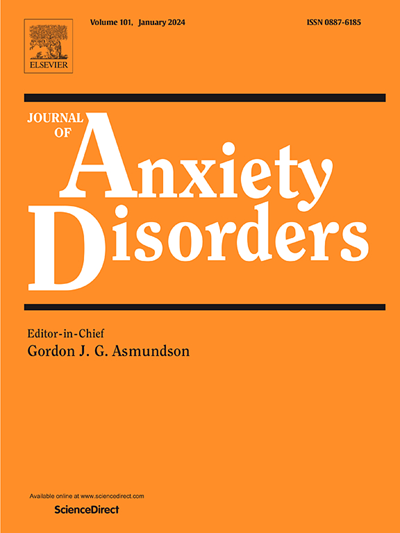Better together? A randomized controlled microtrial comparing different levels of therapist and parental involvement in exposure-based treatment of childhood specific phobia.
IF 4.8
2区 医学
Q1 PSYCHIATRY
引用次数: 0
Abstract
INTRODUCTION Exposure is often limited to homework assignments in routine clinical care. The current study compares minimally-guided (MGE) and parent-guided (PGE) out-session homework formats to the 'golden standard' of therapist-guided in-session exposure with minimally-guided exposure at home (TGE). METHODS Children with specific phobia (N = 55, age 8-12, 56% girls) participated in a single-blind, randomized controlled microtrial with a four-week baseline-treatment period design. Clinical interviews, behavioral avoidance tests, and self-report measures were assessed at pre-treatment, post-treatment, and at one-month follow-up. RESULTS TGE resulted in a larger decline of specific phobia severity from baseline to post-treatment compared to MGE but not compared to PGE. Parental anxiety was found to be a moderator of less treatment efficacy of PGE from baseline to post-treatment. Overall, there was no meaningful difference in efficacy of TGE versus MGE or PGE from baseline to follow-up. CONCLUSIONS These findings suggest that for improving short-term treatment gains, exposure exercises can best be conducted with the help of a therapist within the therapy session before they are conducted as homework assignments outside the therapy session. However, for long-term treatment gains exposure exercises can be handled by the child itself or with help of its parents.更好的在一起吗?一项随机对照微试验,比较不同水平的治疗师和父母参与儿童特定恐惧症的暴露治疗。
简介接触通常仅限于常规临床护理中的家庭作业。目前的研究将最低限度指导(MGE)和家长指导(PGE)的课外作业形式与治疗师指导的课内暴露和最低限度指导的家庭暴露的“黄金标准”进行了比较。在治疗前、治疗后和一个月的随访中评估了临床访谈、行为回避测试和自我报告措施。结果与MGE相比,但与PGE相比,从基线到治疗后,GE导致特定恐惧症严重程度的下降幅度更大。研究发现,从基线到治疗后,父母焦虑是PGE治疗效果较差的调节因素。总的来说,从基线到随访,TGE与MGE或PGE的疗效没有显著差异。结论这些发现表明,为了提高短期治疗效果,暴露练习最好在治疗期间在治疗师的帮助下进行,然后在治疗期间之外作为家庭作业进行。然而,为了获得长期治疗收益,暴露练习可以由孩子自己或在父母的帮助下进行。
本文章由计算机程序翻译,如有差异,请以英文原文为准。
求助全文
约1分钟内获得全文
求助全文
来源期刊

Journal of Anxiety Disorders
Multiple-
CiteScore
16.60
自引率
2.90%
发文量
95
期刊介绍:
The Journal of Anxiety Disorders is an interdisciplinary journal that publishes research papers on all aspects of anxiety disorders for individuals of all age groups, including children, adolescents, adults, and the elderly. Manuscripts that focus on disorders previously classified as anxiety disorders such as obsessive-compulsive disorder and posttraumatic stress disorder, as well as the new category of illness anxiety disorder, are also within the scope of the journal. The research areas of focus include traditional, behavioral, cognitive, and biological assessment; diagnosis and classification; psychosocial and psychopharmacological treatment; genetics; epidemiology; and prevention. The journal welcomes theoretical and review articles that significantly contribute to current knowledge in the field. It is abstracted and indexed in various databases such as Elsevier, BIOBASE, PubMed/Medline, PsycINFO, BIOSIS Citation Index, BRS Data, Current Contents - Social & Behavioral Sciences, Pascal Francis, Scopus, and Google Scholar.
 求助内容:
求助内容: 应助结果提醒方式:
应助结果提醒方式:


